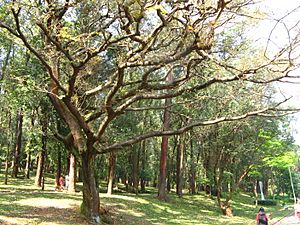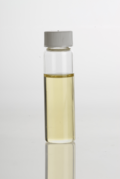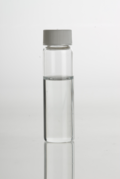Copaiba facts for kids

Copaiba is a special, oily resin that comes from certain trees in South America. These trees are known as Copaifera trees. The resin is a thick, clear liquid that can be light gold or dark brown. Its color depends on how much resin and essential oil it contains. People use Copaiba to make shiny coatings like varnishes and lacquers.
You can also get "copaiba oil" from this resin. It's a clear or light yellow liquid that smells like the resin. This oil is made of natural chemicals, and one important part is called beta-caryophyllene. The name Copaiba also refers to the trees themselves. They are part of the legume family and grow in places like Africa, North America, and South America.
Contents
What is Copaiba Used For?
Making Fuel and Other Products
Copaiba is special because it can be used to make biodiesel, which is a type of fuel. One tree can produce about 40 liters (10.5 gallons) of this resin every year. This makes it a good source for creating fuel.
The resin and its oil are also used to make soaps and perfumes smell nice. They help the scents last longer.
Traditional Uses
People in Brazil have used Copaiba in folk medicine for a very long time, even since the 1500s. They used it as a liquid to drink or as an ointment on the skin. In Panama, some people mix the resin with honey. They give it to newborn babies to help them learn and to protect them. In the Amazon rainforest in Peru, people use Copaiba to keep insects away.
Art and Crafts
Artists also use Copaiba, especially when painting with oils. It helps the paint stick better and gives it a nice shine. Mineral painters use a mix of copaiba, turpentine, and lavender. They use this to mix with their minerals for decorating ceramic items before they are heated in a kiln.
Copaiba in Business
The production of copaiba oil is very important to the Amazon region. It makes up about 95% of Brazil's oil-resin industry. Each year, about 500 tons of copaiba oil are produced in the Amazon.
Selling copaiba as an oil or in capsules has become very popular. This is because many people use it for traditional purposes. Copaiba is also sent to other countries, including the United States, France, and Germany.
The Food and Chemicals Codex, which lists safe ingredients for food, says that copaiba oil is safe to use as a flavoring. Studies show that it is not harmful if taken orally or put on the skin.



